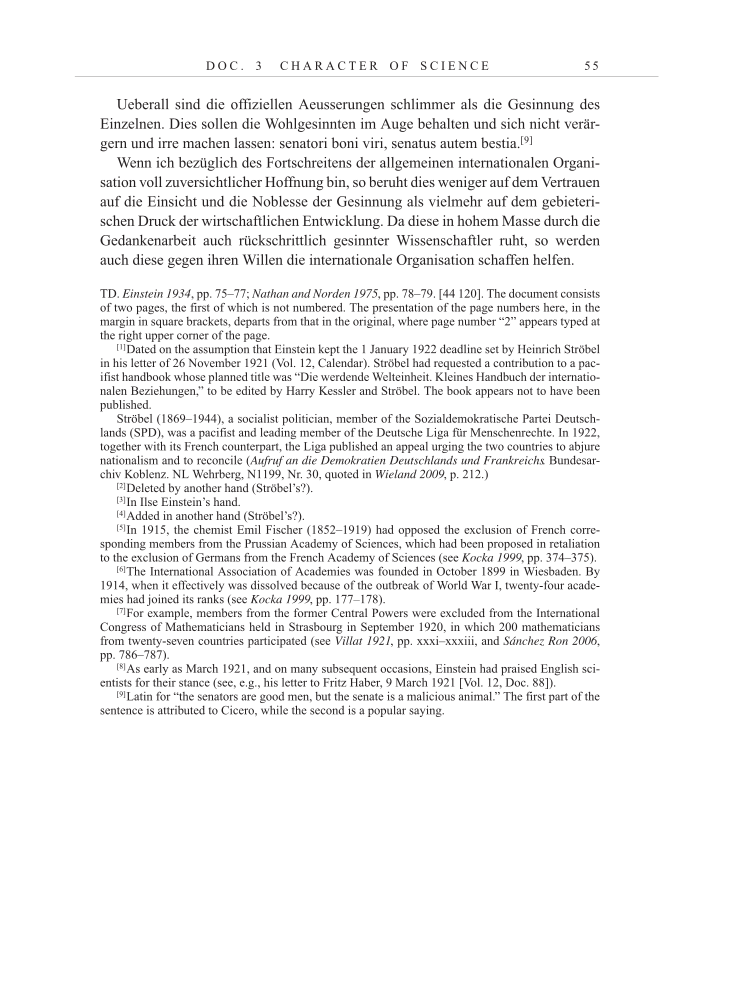D O C . 3 C H A R A C T E R O F S C I E N C E 5 5 Ueberall sind die offiziellen Aeusserungen schlimmer als die Gesinnung des Einzelnen. Dies sollen die Wohlgesinnten im Auge behalten und sich nicht verär- gern und irre machen lassen: senatori boni viri, senatus autem bestia.[9] Wenn ich bezüglich des Fortschreitens der allgemeinen internationalen Organi- sation voll zuversichtlicher Hoffnung bin, so beruht dies weniger auf dem Vertrauen auf die Einsicht und die Noblesse der Gesinnung als vielmehr auf dem gebieteri- schen Druck der wirtschaftlichen Entwicklung. Da diese in hohem Masse durch die Gedankenarbeit auch rückschrittlich gesinnter Wissenschaftler ruht, so werden auch diese gegen ihren Willen die internationale Organisation schaffen helfen. TD. Einstein 1934, pp. 75–77 Nathan and Norden 1975, pp. 78–79. [44 120]. The document consists of two pages, the first of which is not numbered. The presentation of the page numbers here, in the margin in square brackets, departs from that in the original, where page number “2” appears typed at the right upper corner of the page. [1]Dated on the assumption that Einstein kept the 1 January 1922 deadline set by Heinrich Ströbel in his letter of 26 November 1921 (Vol. 12, Calendar). Ströbel had requested a contribution to a pac- ifist handbook whose planned title was “Die werdende Welteinheit. Kleines Handbuch der internatio- nalen Beziehungen,” to be edited by Harry Kessler and Ströbel. The book appears not to have been published. Ströbel (1869–1944), a socialist politician, member of the Sozialdemokratische Partei Deutsch- lands (SPD), was a pacifist and leading member of the Deutsche Liga für Menschenrechte. In 1922, together with its French counterpart, the Liga published an appeal urging the two countries to abjure nationalism and to reconcile (Aufruf an die Demokratien Deutschlands und Frankreichs. Bundesar- chiv Koblenz. NL Wehrberg, N1199, Nr. 30, quoted in Wieland 2009, p. 212.) [2]Deleted by another hand (Ströbel’s?). [3]In Ilse Einstein’s hand. [4]Added in another hand (Ströbel’s?). [5]In 1915, the chemist Emil Fischer (1852–1919) had opposed the exclusion of French corre- sponding members from the Prussian Academy of Sciences, which had been proposed in retaliation to the exclusion of Germans from the French Academy of Sciences (see Kocka 1999, pp. 374–375). [6]The International Association of Academies was founded in October 1899 in Wiesbaden. By 1914, when it effectively was dissolved because of the outbreak of World War I, twenty-four acade- mies had joined its ranks (see Kocka 1999, pp. 177–178). [7]For example, members from the former Central Powers were excluded from the International Congress of Mathematicians held in Strasbourg in September 1920, in which 200 mathematicians from twenty-seven countries participated (see Villat 1921, pp. xxxi–xxxiii, and Sánchez Ron 2006, pp. 786–787). [8]As early as March 1921, and on many subsequent occasions, Einstein had praised English sci- entists for their stance (see, e.g., his letter to Fritz Haber, 9 March 1921 [Vol. 12, Doc. 88]). [9]Latin for “the senators are good men, but the senate is a malicious animal.” The first part of the sentence is attributed to Cicero, while the second is a popular saying.
